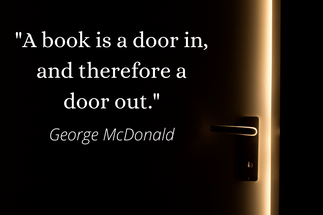 Among certain circles of indie speculative fiction writers, it seems a popular topic to think about and talk about the virtues of fiction. This topic is even more popular among Christian speculative fiction writers, I think in large part, because fantasy and science fiction have for some time been controversial in a community that is founded on historical truth. In other words, why would you fill your mind with silly imaginations when you could be, or should be filling it with Biblical truths? Here’s a few of my cents on the topic. For the Christian, there is no more important book to read than the Bible. I openly admit and gladly share that I am a Christian. It’s true for me. Let every book in the world be lost, but don’t take my Bible. That’s where I’m at. However, I am a great appreciator of fantastical fiction (speculative fiction - they are all the same thing in my mind), and as it would happen, I have become a writer of the genre as well. I am one of those writing the kinds of stories that provide readers an escape from their everyday life. Hmmm. Escape. Is that good? I think “escape” is far more complicated than “good” or “bad” as an overarching moral designation. It depends on what’s being escaped. For instance, the desire to escape pain, turmoil, chaos, discord, and everything that sin has created by its corruption of God’s initial design is perfectly natural. Actually, for the Christian, this escape is part of the great promise found in Jesus Christ. Jesus has made a way for us to be forgiven of our sin, and so has provided us victory over sin, an eventual escape from its grip. And because sin brings death, Jesus gives us victory over death. To want to escape this fallen world is perfectly normal. It is, I dare say, good. But what does our desire to escape this painful reality cause us to do? Do we simply, and only want a way out? To quote one of the pioneers of modern fantasy fiction, George McDonald, “The only door out is a door in.” McDonald spoke this idea through his other-wordly librarian, Mr. Raven, in his novel Lilith. Mr. Raven clarifies this existential statement in the following way: “A book,” he said louder, “is a door in, and therefore a door out.” Could we say that the ultimate book of escape is actually The Holy Bible? The Bible is no speculative work of fiction, and Jesus Christ was a real person, more real than your next breath. But, as C.S. Lewis described in the story of his own journey of faith, J.R.R. Tolkein convinced him that the story of Christ is a true myth: a myth working on us in the same way as the others (pagan myths), but with this tremendous difference that it really happened. And I would add, that the reason I suggest the Bible is the ultimate escape, is that it gives us the very map for our escape from this fallen, broken world, and it comes in the form of a man, who was God: Jesus Christ. For Christians, maybe even more than anyone else on this green earth, escape through a book, or a story, is at the center of our identity. The real question is not whether escape is good or bad, but which escape you are taking, and where - or to whom, it leads you. If you are only trying to get out of something, you will find that it is not just hard to do, it may lead to another place from which you wish to leave. I plan to continue reading and writing fantastical fiction. I’ve found the one who is the “door in” to reconciliation with God and therefore the “door out” out of this broken world. But so long as I am in the vestibule of Christian life, I plan to write books that can be a “door in” as well, hopefully leading those that are further out, toward the one true door. For . . . one open door can lead to another.
2 Comments
|
Archives
February 2020
Categories |
